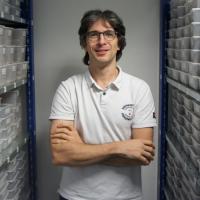
Biodiversity Reading time 5 min
Samuel Mondy, the DNA of soils
Published on 23 January 2019
Every cubic centimetre of the earth is inhabited by millions of bacteria, fungi and other microbes. This proliferation of life, the importance of which in major ecological processes is gradually coming to light, is subject to several types of pressure, including intensive agriculture, pollution and climate change. In response to the rapid changes they cause, 39 year-old Samuel Mondy became a sort of biodiversity archivist. The bioinformatics specialist manages GenoSol, a platform which preserves thousands of French soil samples and analyses all microbial genomes contained within.
Archiving soil biodiversity
As soon as he began his studies at the Université Paris Sud, Samuel Mondy knew he wanted to be a researcher. The mysterious yet familiar world of microbes were of particular interest to him. His 2004 doctoral thesis looked at symbiosis between legumes and nitrogen-fixing bacteria. In 2005, he began post-doctoral studies at the Centre de Cadarache (CEA) on plant responses to pathogens and heavy metal toxicity.
He then returned to the Institute of Plant Science – where he had completed his doctoral studies – to conduct a study on the impact of genetically modified organisms on their environment. He gradually gave up the lab bench and became specialised in bioinformatics. Powerful digital tools made it possible to study entire ecosystems in addition to genes and certain mechanisms, and introduced Samuel Mondy to the age of metagenomics: the sequencing and analysis of all genomes present in a given setting.
Terrestrial genomes and marine genomes
In 2014 he put this new expertise to use by working on the Tara Oceans project for one year and a half, developing new methods of identifying organisms present in sea water samples from every ocean. He also analysed the genomes of single cells found in these marine ecosystems.
The age of metagenomics
Dr Mondy joined INRA in November 2015 as a research engineer at the Joint Research Unit for Agroecology at INRA Dijon Bourgogne Franche-Comté. His mission: carry out bioinformatics analyses for GenoSol, a platform created in 2008, of which he became manager soon after. GenoSol has three core tasks. The first one is to build a conservatory of soil-based genetic resources. In -40 °C freezers, the platform already preserves over 11,000 samples and receives one to two thousand additional samples every year. Why keep the samples? “By doing so we can make comparisons over time. We’ll be able to see changes in these ecosystems resulting from the different pressures to which they are subject, and test models designed to predict these changes. Also, technology may improve, allowing us to extract new information from these samples in the future,” explains Samuel Mondy.
Another mission of the platform is to analyse the DNA of microbes present in the samples in order to identify and describe microbial populations. This analysis produces large quantities of data which GenoSol processes and stores. The platform provides a range of valuable services for researchers studying soil ecology and plant/atmosphere interaction. Together with the Institute of Ecology and Environmental Sciences in Paris, GenoSol studied the microbial community which develops underneath grass, in both urban and rural areas.
Despite his many duties, Samuel Mondy is also planning new projects, such as the characterisation of the functional capacities of soils and their ability to adapt to the anthropization of an environment.
This father of three and keen fan of sci-fi novels uses his little spare time left to read and practice his badminton swing.
- 1977 : Born in Clamart (Paris region)
- 2004 : PhD in plant cell and molecular physiology from the Université Paris Sud
- 2005 : Researcher at CEA – Cadarache
- 2008 : Research engineer at CNRS and the Institute of Plant Science
- 2014 : Research engineer at Génoscope, CEA, Tara Oceans project
- 2015 : Joins the Agroecology Unit at INRA Dijon Bourgogne Franche-Comté as a bioinformatics research engineer. Manager of the GenoSol platform
